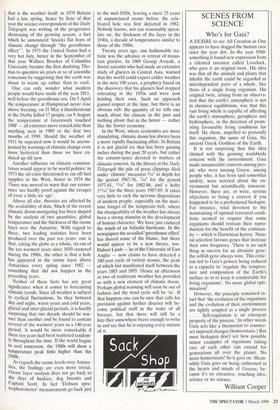SCENES FROM SCIENCE
Who's for Gaia?
A DESIRE to see All Creation as One appears to have dogged the human race since the year dot. In the year 1960- something it found new expression from a talented inventor called Lovelock, who gave it an original twist. His idea was that all the animals and plants that inhabit the earth could be regarded as interdependent parts of a whole, like those of a single living organism. His original twist, arising from an observa- tion that the earth's atmosphere is not in chemical equilibrium, was that this vast living whole is capable of affecting the earth's atmosphere, geosphere and hydrosphere, in the direction of prom- oting favourable living conditions for itself. He chose, impelled to personify this organism, the name of Gaia, the ancient Greek Goddess of the Earth.
It is not surprising that this idea chimed with the growing worldwide concern with the environment. Gaia made innumerable converts among peo- ple who were turning Green, among people who, it has been said somewhat snidely, were worried about the en- vironment but scientifically innocent. However, there are, or were, serious objections to being a convert if you happened to be a professional biologist. For instance, total devotion to the maintaining of optimal terrestral condi- tions seemed to require that some organisms should restrain their repro- duction for the benefit of the commun- ity — which is Darwinian heresy. Natu- ral selection favours genes that increase their own frequency. There is no such thing as success for an altruistic gene: the selfish gene always wins. This critic- ism led to Gaia's powers being reduced to a capacity to 'regulate the tempera- ture and composition of the Earth's surface so as to keep it comfortable for living organisms'. No more global opti- misation!
However, the principle remained in- tact that 'the evolution of the organisms and the evolution of their environment are tightly coupled as a single process . Self-regulation is an emergent property of the process.' In other words Gaia acts like a thermostat to counter- act imposed changes (homeostasis.) But most biologists don't see how possible minor examples of organisms taking care of each other can extend for generations all over the planet. No more homeostasis! So it goes on. Mean- while Gaia goes on being enthroned in the hearts and minds of Greens; be- cause it's an attractive, touching idea, science or no science.
William Cooper


























































 Previous page
Previous page